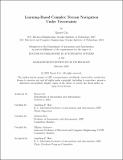Learning-Based Complex Terrain Navigation Under Uncertainty
Author(s)
Cai, Xiaoyi
DownloadThesis PDF (23.22Mb)
Advisor
How, Jonathan P.
Terms of use
Metadata
Show full item recordAbstract
In complex off-road environments, accurately identifying traversable terrain is crucial for achieving fast and reliable navigation. Existing methods learn terrain properties directly from data via self-supervision to automatically penalize trajectories moving through undesirable terrain. However, challenges remain in properly quantifying and mitigating risk due to uncertainty in learned models and improving model generalization in novel environments. To address these challenges, this thesis presents a unified framework to learn uncertainty-aware, physics-informed traversability models and achieve risk-aware navigation in both indistribution and out-of-distribution terrain. First, the proposed method efficiently quantifies both aleatoric and epistemic uncertainty by learning discrete traversability distributions and probability densities of the traversability predictor’s latent features. Leveraging evidential deep learning, this work parameterizes Dirichlet distributions with network outputs and proposes a novel uncertainty-aware squared Earth Mover’s distance loss with a closed-form expression that enhances learning accuracy and navigation performance. Second, the proposed method achieves risk-aware navigation by simulating state trajectories with the worst-case expected traversability values to handle aleatoric uncertainty and by penalizing trajectories moving through novel terrain with high epistemic uncertainty. Third, the proposed method improves model generalization by embedding physics priors directly into the mathematical formulation of evidential neural networks and implicitly aligning learned models with physics models through a physics-informed training loss. Finally, through extensive simulation and real-world experiments on wheeled and quadruped robots, it is demonstrated that this work leads to faster navigation with higher success rates when compared to existing risk-aware approaches, even in environments with significant distribution shifts.
Date issued
2025-02Department
Massachusetts Institute of Technology. Department of Aeronautics and AstronauticsPublisher
Massachusetts Institute of Technology